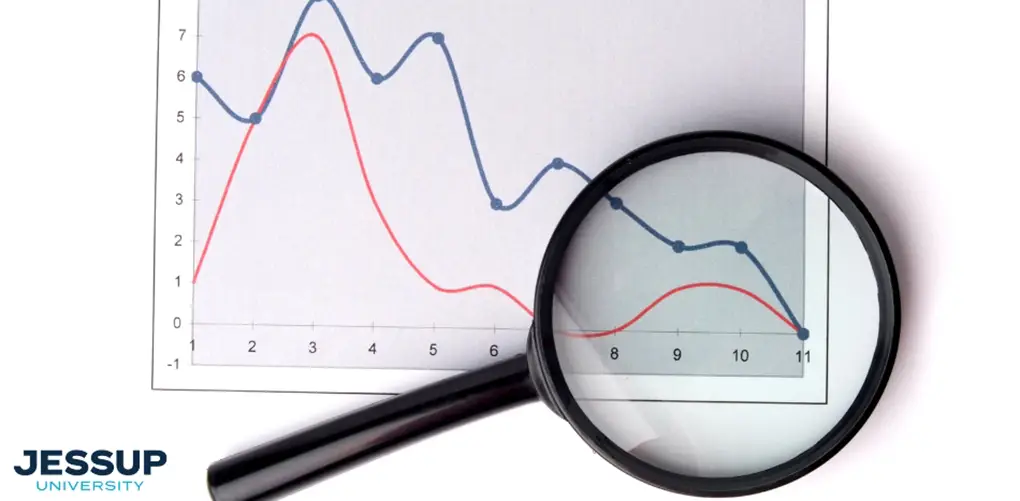
Data Analyst vs. Data Scientist: Understand the Difference in Data Science Careers
Interested in a career in data? Understanding the difference between a data analyst and a data scientist is important for anyone interested in pursuing a career working with data. While the roles may seem similar on the surface, when you dig deeper, some key differences emerge related to responsibilities, required skills, salaries, and more.
What is a Data Analyst?
A data analyst is responsible for interpreting data – known as data analytics – to identify insights and trends. The core work involves querying databases, processing and cleaning data, analyzing results, and sharing findings via dashboards, reports, and visualizations to support business decision-making.
Data analysts collaborate closely with internal stakeholders to understand business challenges and identify relevant data sources to analyze. Their data analytics skills allow them to translate raw numbers into meaningful conclusions for business leaders.
Day-to-Day Data Analyst Responsibilities
- Data Collection: Gather data from databases and other sources
- Data Cleaning: Fix inconsistencies and inaccuracies in data sets
- Data Analysis: Use statistical techniques and programming languages to analyze data
- Data Visualization: Create charts, graphs, and dashboards to communicate insights
- Reporting: Distill findings into presentations, reports, and recommendations
Key Data Analyst Skills
- Technical Skills: SQL, Python, R, data analysis, data visualization, statistics
- Soft Skills: Communication, collaboration, critical thinking, problem solving
Data analysts need to balance strong technical abilities with soft skills to translate complex data findings into an understandable format for business stakeholders. Presentation expertise and storytelling skills are also vital.
Data Analyst Educational Background
Most data analyst positions require a bachelor’s degree in a field like computer science, mathematics, statistics, or information systems. Coursework in business analytics and data visualization is also beneficial. While not always required, master’s degrees related to data analytics and business intelligence can provide additional skills.
Want To Learn Computer Science From Home?
Jessup University’s Unique Online BS in Computer Science Can Make It Happen!
What is a Data Scientist?
A data scientist utilizes statistical modeling, machine learning, and programming to uncover value in data. They design and construct new data collection pipelines to solve business challenges through predictive modeling and advanced analytics techniques.
Data scientists work closely with leadership teams across functions ranging from R&D to marketing in order to drive innovation and optimize processes. Their expertise allows them to find hidden insights and quantify unknowns using vast, complex data sources.
Day-to-Day Data Scientist Responsibilities
- Data Pipeline Development: Architect data collection systems
- Predictive Modeling: Design machine learning models to predict outcomes
- Algorithm Development: Create algorithms for data mining and analysis
- Data Visualization: Translate technical findings into digestible formats
- Thought Leadership: Provide strategic guidance grounded in advanced analytics
Key Data Scientist Skills
- Technical Skills: Machine learning, AI, big data platforms, Python, R
- Soft Skills: Creativity, intellectual curiosity, problem solving, storytelling
Data scientists require coding abilities combined with curiosity and creative thinking to extract meaning from messy, unstructured data sources. Their findings inform executive decision-making, so communication expertise is vital as well.
Data Scientist Educational Background
Want to become a data scientist? Most data science jobs require an advanced degree – after a Bachelor’s in Computer Science – such as a master’s or Ph.D. Common fields of study include statistics, mathematics, computer science, analytics, information systems, or operations research. Some data scientists transition after gaining experience as a data analyst earlier in their careers.
Key Differences: Data Analyst vs. Data Scientist
While data scientists and data analysts work toward the shared goal of deriving value from data, there are some core differences between these two career paths in terms of focus, responsibilities, capabilities, background, and pay.
| Topic | Data Analyst | Data Scientist |
|---|---|---|
| Focus | Analyzing past data to uncover insights | Building predictive models and discovering new data value |
| Responsibilities | Querying databases, analyzing results, visualizing and reporting findings | Developing data pipelines, applying machine learning algorithms, quantifying unknowns with statistical modeling |
| Skills | SQL, Python, R, statistics, communication | Machine learning, AI, advanced statistical modeling, creativity |
| Background | Bachelor’s degree in statistics, mathematics, computer science | Master’s or Ph.D. in computer science, analytics, statistics |
| AVG Salary | $74,000 per year | $114,000 per year |
While data analysts concentrate more on summarizing what happened based on past data, data scientists leverage robust technical skills to predict what will happen in the future. Data scientists also tend to have more advanced educational backgrounds along with higher average salaries.
However, strong growth and demand is fueling newly created roles across data analytics and data science. Many organizations are investing heavily in building out their capabilities to derive value from data and power data-driven decision making. Let’s explore the career trajectories and options within each field.
Comparing Skills: Data Analyst vs Data Scientist

Beyond the differences in focus and responsibilities across the two roles, data analysts and data scientists require some distinct technical skill sets. However, some fundamental abilities are indispensable for either career path.
Overlapping Analyst & Scientist Skills
Data technology expertise along with intellectual curiosity and critical thinking allow both data analysts and data scientists to translate numbers into impactful business insights.
- Technologies: SQL, Python, R, statistical analysis, data visualization
- Cognitive Abilities: Critical thinking, intellectual curiosity, problem solving
Data Analyst-Specific Skills
Data analysts spend extensive time working cross-functionally to ensure analytics outputs align with business needs. Customer-facing and collaborative skills drive this integration.
- Soft Skills: Communication, presentation, storytelling, collaboration
- Technical Skills: Business analysis, data modeling, dashboard development
Data Scientist-Specific Skills
Data scientists work closely with the latest techniques and technologies to create value from data where none existed previously.
- Technical Skills: Machine learning, AI, predictive modeling, algorithm development
- Soft Skills: Creativity, abstraction, testing assumptions
The distinctions between data analyst and data scientist skills show up clearly when examining typical daily work examples.
Data analysts apply their business analysis skills to explaining what trends exist in the data and what actions they suggest, while data scientists utilize machine learning expertise to build models predicting customer churn.
Data Analyst vs Data Scientist Salaries

The advanced technical and educational requirements for data scientists translate into higher average salaries than data analyst roles. However, data analytics still offers strong compensation prospects and the career outlook is quite impressive considering the tech advances of recent years.
According to PayScale.com, the average mid-career data analyst salary in the United States is $74,353. Entry-level data analyst salaries begin around $45,000 with senior-level roles reaching upwards of $120,000 per year.
For data scientists, the average base pay exceeds $114,141 according to PayScale.com, with experienced data science leaders earning $165,000 or more in total compensation at top technology companies. Given high demand, data scientists often command competitive salaries.
Ultimately attractive pay and abundant job openings await qualified candidates across both data analysis and data science. By developing expertise in translating data into impact, professionals in either field can expect sound compensation.
Choosing Between Data Analyst vs Data Scientist
Deciding whether to pursue becoming a data analyst vs a data scientist depends largely on your skills, interests, education background, and career goals.
Best If You Enjoy:
Data Analyst: Analyzing business metrics, communicating insights, translating numbers into action, solving specific questions with data.
Data Scientist: Building models using advanced analytics disciplines, discovering hidden patterns within complex data, quantifying the unknown, creativity.
Best If You Have:
Data Analyst: Bachelor’s degree in statistics, math, or business analytics.
Data Scientist: Master’s or PhD in computer science, statistics, analytics, or information systems.
Best If Your Goal is To:
Data Analyst: Apply analysis skills to enable data-driven business decision making.
Data Scientist: Leverage modeling, statistics, and machine learning expertise to maximize business value from data.
Data Analyst or Data Scientist Career Paths

Are you looking to become a data analyst or data scientist with skills that make you an attractive candidate to many hiring organizations? Well, Jessup University’s Bachelor of Science in Computer Science presents an in-depth program that’ll get you on the right path to either. With on-campus or online learning options, students can choose their preferred format to excel.
Flexible Learning Modes for Aspiring Data Professionals
Students have the flexibility to choose between on-campus and online learning modes. Those attending in person gain from direct interactions with faculty, collaborative opportunities with peers, and engaging in various campus events structured over 15-week semesters.
Conversely, online learners benefit from the convenience of flexibly accessing course materials and faculty support over accelerated 7-week terms.
Focusing On Alternative Learning Methods for Future Data Analysts or Data Scientists
Central to both learning paths is a focus on the critical elements of data analysis or data science. The curriculum is designed to foster a deep understanding of the data process, combining specialized courses, practical projects, and a strong emphasis on ethical considerations.
Critical Skills for Newly Trained Data Pros
What is computer science? The field of study focuses on computation, information, and automation using computers and computational systems. It’s the backbone and foundation behind data analytics and can lead you in many directions within the tech space.
The program ensures that graduates are well-equipped with a broad range of skills relevant to data analytics. Through required and elective courses, Jessup University’s CS curriculum equips graduates with well-rounded proficiency spanning:
- Fluency in Python, R, and SQL for manipulating, analyzing, and visualizing data
- Statistical modeling, simulation, forecasting, and experimental design techniques
- Database architecture, warehousing, and large-scale distributed systems
- Supervised, unsupervised, and reinforcement machine learning algorithms
- Dashboard, report, and presentation development skills
- Integrating concepts of software engineering and computer programming with creative design
Developing Both Technical and Interpersonal Skills in a Team-Oriented Setting
With an emphasis on small class sizes, Jessup University promotes a close-knit learning community where students develop hard technical and soft skills, such as communication and teamwork, through real-world applications.
Education with a Strong Sense of Ethics
The program equips students with technical skills and instills moral values grounded in Christian principles. This approach ensures the cultivation of responsible, professionally prepared graduates ready to embark on their career path in data analytics.
Want To Learn Computer Science From Home?
Jessup University’s Unique Online BS in Computer Science Can Make It Happen!
Let’s Get Started on Your Data Career at Jessup University
Jessup University’s Bachelor of Science in Computer Science is an ideal stepping stone for those wanting a career as a data analyst, offering a balanced mix of theoretical knowledge, practical skills, ethical grounding, and flexible learning options.
The world needs talented data analysts and scientists who understand our data-centered reality. Are you ready to fulfill this challenging yet gratifying role? If so, contact Jessup University today; you could be on your way to a new, rewarding career!
More Engineering & Technology Articles
-

Why Pursue a Career in Software Testing?
In today’s digital age, software applications, tools and platforms impact nearly every aspect of our personal and professional lives. As society becomes increasingly reliant on…
-

Best Degree for Web Development: Your Path to Becoming a Web Developer in 2024
A career in web development is one of the hottest tech fields right now. With the internet continuing to expand and companies relying on robust online platforms,…
-

What Do Computer Scientists Do? A Deep Dive into The Computer Science Field
Computer science is a rapidly growing and dynamic field that plays a vital role in powering the technology we use every day. But what exactly…
